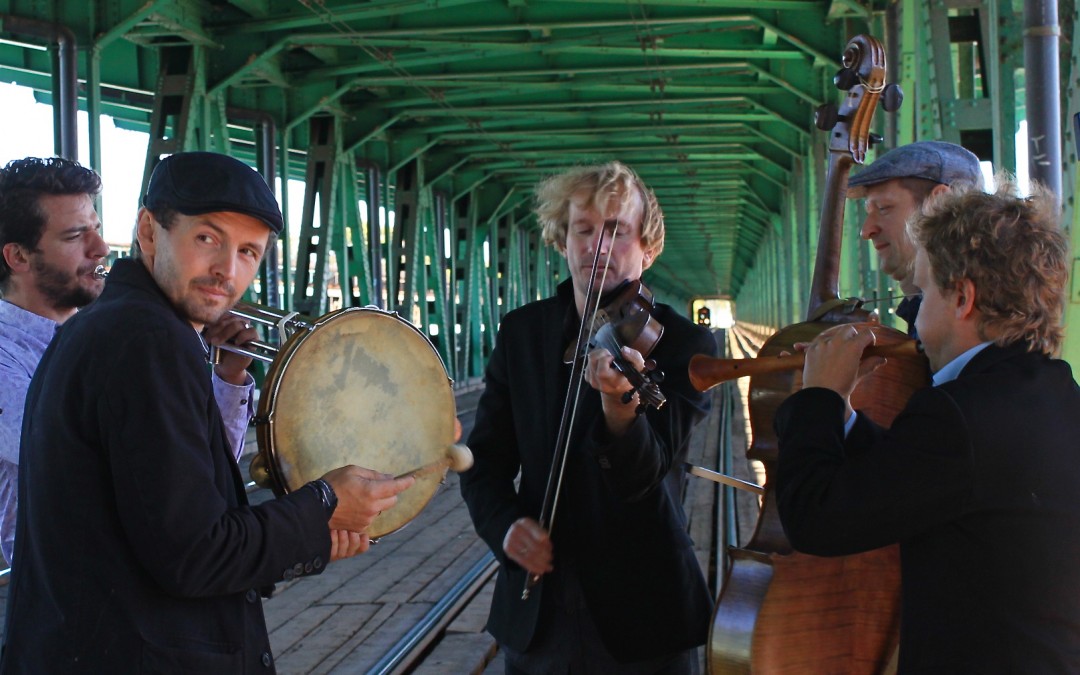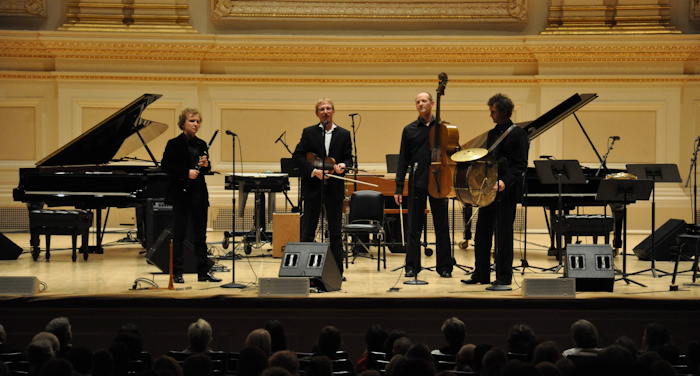El legado musical que Polonia ha aportado al mundo es sin duda de los más amplios y de mayor alcance. Mazurcas, originales de un contexto rural y fuente de inspiración para versiones por todo el mundo, desde Suecia a Filipinas, pasando por Cabo Verde y América Latina, y polonesas, danzas asociadas a las clases nobles, eran ya términos de difusión global, mucho antes de la era de la información, sistematizadas y elevadas al contexto de la música erudita occidental por autores referenciales, como el romántico Frédéric Chopin, y por otros muchos, no polacos también, como Telemann, Músorgski, Débussy, Ravel, Scriabin, Borodin, Dvořák o Schubert.
¿Qué honda emoción subyace a una música que ha subido a los palacios y ha bajado a las cabañas, que ha recorrido siglos y continentes, en una transmutación inconclusa? Es la misma emoción, a veces contenida, a veces arrebatada, de la música que nos ofrecen Janusz Prusinowski Kompania.
Janusz ha encontrado esa emoción precisamente en los portadores de esa herencia popular, en sus fuentes vivas, que son los viejos músicos rurales. Desde de su punto de vista contemporáneo, con ese profundo conocimiento unido a una gran destreza técnica, dan un paso adelante para crear un nuevo repertorio que crea belleza y verdad.
- “El grupo de Janusz Prusinowski es el mejor representante de la revolución de la música tradicional de Polonia” Andrew Cronshaw, artista y crítico musical de fRoots, Gran Bretaña
- “El homenaje más vital y estimulante al legado musical polaco” Simon Broughton, crítico musical en Songlines, Gran Bretaña
- “Lo que me impactó de esta música es su sorprendente capacidad de unir el sentir y la fuerza de la música rural con la sensibilidad contemporánea de sus intérpretes” Michal Shapiro, Huffington Post, EEUU
Janusz Prusinowski es violinista, toca el acordeón polaco, el cimbalón y canta con una naturalidad como quien respira. Piotr Piszczatowski aporta la percusión, con sus patrones imprevisibles que el cuerpo acaba sintiendo como evidentes. Michał Żak es responsable de los vientos, toca flauta, clarinete y una chirimía que recuerda a las dulzainas más arabizantes de la música del Levante ibérico. Piotr Zgorzelski toca el muy peculiar bajo folk, cuya forma es más bien la de un violoncello y ejerce con destreza de maestro de baile cuando el contexto se presta a ella. El sonido nostálgico y desgarrador de la trompeta es a cargo de Szczepan Pospieszalski.
El trabajo de Janusz durante 20 años en la búsqueda de esos viejos maestros, así como su labor de fundador y director artístico del Festival Mazurcas del Mundo, en Varsovia, le han hecho valedor de la medalla de bronce Gloria Artis, del Ministerio de Cultura y Patrimonio Nacional polaco, en diciembre de 2014.
El grupo ha presentado su directo y han desarrollado talleres de danzas tradicionales en teatros, festivales al aire libre, museos,… por toda Europa, en Canadá y Estados Unidos, donde han tocado en templos de la música como el Carnegie Hall de Nueva York o el Chicago Symphony Center, y en Asia, y han sido parte de la selección artística de la feria mundial más importante de músicas del mundo: Womex Salónica 2012 y Womex Cardiff 2013. Con ellos se abre un nuevo ciclo en la larga historia de la conquista global de la música polaca.
Escúchalos:
Entrevistas:
- Entrevista en MusicasDelMundo.com (texto en castellano)
- Entrevista en De Més en Llà (audio en castellano)
Foto superior: Joanna Wiedro
Foto: Janusz Prusinowski Kompania en Womex 2012, por Yannis Psathas

Foto: Janusz Prusinowski Kompania en Carnegie Hall, por Anna Fields
Foto a continuación: Robert Widera
The musical legacy that Poland has provided to the world is undoubtedly one of the largest and with widest reach. Mazurkas (mazurek), from a rural context, source for the inspiration of variants all over the world, from Sweden to Philippines, from Cabo Verde to Latin America, and polonaise dances (chodzony), refined in the aristocratic circles, were terms of global outreach much more before the Information Age, systematized and raised to the classical music context by key composers, like the Romantic Frédéric Chopin and much more, also no Polish ones, like Telemann, Músorgski, Débussy, Ravel, Scriabin, Borodin, Dvořák or Schubert.
Which is the deep emotion that underlie in a music that, refering to the Romantic character of the Spanish literature Don Juan, has climbed to the palaces and has gone down to the huts, that has gone across centuries and continents, in an unfinished transmutation? That is the same emotion, sometimes contained, sometimes unbridled, of the music that Janusz Prusinowski and his partners offer.
Janusz has found that emotion exactly in its bearers of that popular inheritance, in its living sources: the old rural musicians. From his contemporary approach, with that deep knowledge, combined with their high technical skills, Janusz and his partners take a step forward to build a new repertoire that creates beauty and truth.
- “These guys play with high skill and all the fire and rhythmic energy of the village musicians they’ve learned from […] The music they produce, lurching, rhythm-jumping is vigorous, grainy-textured, even appearing rough on the surface, but in no way is any of the playing anything but extremely skilled” Andrew Cronshaw, artist and music critic in fRoots, Great Britain
- “A powerful statement of faith in the strength of Poland’s traditional culture.” “Janusz Prusinowski plays like a man possessed, flinging his head around as if incitingeveryone to dance. And he is a man possessed with a passion for Poland’s village musicand the three-beat rhythms of the mazurka(mazurek), oberek and polonaise”. Simon Broughton, music critic in Songlines, Great Britain
- “What struck me right away about this music was its amazing ability to mix the feel and power of village dance music with the personal contemporary sensibilities of the players.” Michal Shapiro, Huffington Post, EEUU
The work made by Janusz for more than 20 years searching those old masters, as well as his iniciative as founder and artistic director of the Wszystkie Mazurki Świata (Festival Mazurkas of the World) in Warsaw have earned him the bronze medal Gloria Artis, by the Ministry of Culture and National Patrimony from Poland, on December 2014.
Janusz Prusinowski is violinist, plays the Polish accordeon, the cymbal and sings in a manner as natural as breathing. Piotr Piszczatowski provides the percusion, with its unpredictable patterns that the body finally feels like evident. Michał Żak is in charge of the wind instruments, playes flute, clarinet and a shawm that remember the Arabised dolçainas from the Iberian East. Piotr Zgorzelski plays the very peculiar folk bass, with a shape similar to a cello and acts with dexterity as dancing teacher wherever the contexts is suitable for it. The nostalgic and heartshaking sound of the trumpet is provided by Szczepan Pospieszalski.
The band has played all over Europe, at Canada and the USA, where they have played in temples of the music, like the Carnegie Hall in New York and the Chicago Symphony Center, also in Asia, and they have been selected for the most important global trade fair of world music: Womex Thessaloniki 2012 and Womex Cardiff 2013.
With them a new cycle in the long History of the global conquest by Polish music is open.
Listen to them:
Interviews:
Photo at the top: Joanna Wiedro
Photo: Janusz Prusinowski Kompania at Womex 2012, by Yannis Psathas

Photo: Janusz Prusinowski Kompania at Carnegie Hall, by Anna Fields
Photo: Robert Widera



